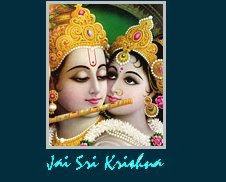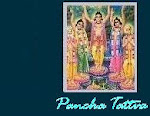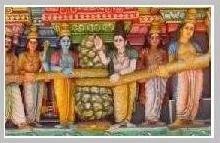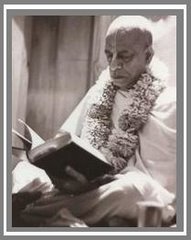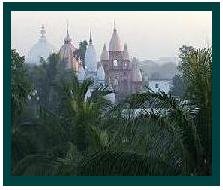 Sound must have Divine characteristic, Krsna, Hari, these sounds are nirguna and Divine.
Sound must have Divine characteristic, Krsna, Hari, these sounds are nirguna and Divine. Sabdha brahma nama-krsna vaikuntha-
nama-grahane asesagha haram viduh.
The name must be of finite characteristic that can take away all that is undesirable in us.
The name must have a spiritual conception not mere physical imitation, that can be produced only by the help of the lip and tongue. Krsna-nama, Hari-nama, Visnu, Narayana, all these are Vaikuntha-nama, it is necessary that They have spiritual existence, that is all in all. They must have spiritual depth, not imitation. Physical imitation is not the name proper. Not sabdha-brahma. Only the imitation sound may come out, but not depth. So name means nama-brahma, nama-krsna, name means it must have some spiritual background or spiritual truth to be distributed through the physical sound. Just like a pill in homeopatic medicine, the pill is not the medicine. It may be Nux-vomica, Belladona or anything else, but the globule is not the medicine. So sound is not Krsna, but Krsna is within.
The name must be surcharged with the spirit , and that spirit is not of mundane character. That is not found even in the Sankara school, or the Mayavadi school, because their faith is that the name is not confined within the jurisdiction of the physical, but it is only mental, sattva-guna. That is also product of this maya, misconception. That is their misunderstanding. So, those that think, that Hari-nama, Krsna-nama, Siva-nama all are one and the same, like the Rama-Krsna Mission or the Sankara school teach like that. But that idea originates in the plane of misunderstanding. So suddha-nama must have it’s original form in nirguna-bhumika, far beyond the area of the misconception of maya. The influence of maya is applicable up to Viraja, then Brahmaloka, then Paravyoma. The real name must have it’s origin from Paravyoma, and Krsna-nama is originating from Goloka, the most original plane of the whole existence. To be really Krsna-nama it must have it’s origin in the highest plane of Vrndavana.
Nama-akara, the mere physical sound is not the name proper. The real name is necessary for us not only to get out of this world of maya or misunderstanding, but for the attainment of the service of Krsna in Vrndavana. That can lift us - the name which has it’s origin in the Vrndavana plane - only that can take us there. Otherwise, if the spirit in the name, the sound, is of any other type it may take us to that mundane place only. It is quite scientific, not unreasonable.
So a mere word is not the name. The meaning and the gist of meaning, the deep conception of the meaning, that is everything - all in all. It is all important to serve our purpose.
- Sri Srila Bhakti Rakshak Sridhar Dev-Goswami Maharaj -
















